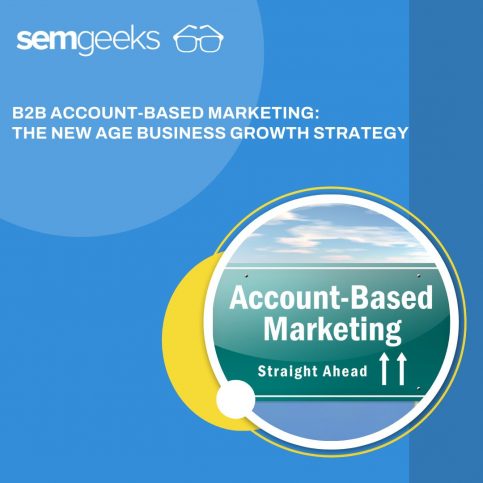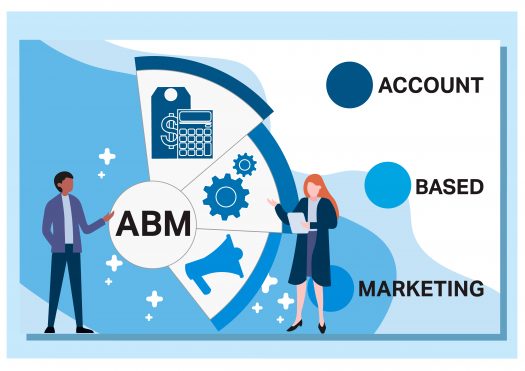In the dynamic landscape of modern business growth strategies, B2B Account-Based Marketing (ABM) has emerged as a game-changer. This marketing approach is centered around targeting specific high-value accounts and engaging them with personalized, tailor-made interactions. ‘
In this article, we will delve into the key components of B2B ABM, its importance in the new age of business growth, implementation strategies, challenges, best practices, tools and technologies, and real-life success stories.
Understanding B2B Account-Based Marketing (ABM)
 Differentiating ABM from traditional marketing approaches.
Differentiating ABM from traditional marketing approaches.
Account-Based Marketing stands apart from traditional marketing methods by focusing solely on high-value target accounts rather than mass targeting. This enables businesses to create highly personalized and relevant interactions for each account.
The key differences that make ABM different from traditional marketing approaches are in the planning, targeting, and execution of campaigns. When it comes to planning an ABM strategy, businesses need to identify their top accounts and then create a tailored plan to engage them. This could involve analyzing their customer journey or creating custom content for each account. Giving each customer their own ideal customer profile.
Targeting with ABM also differs from traditional marketing as it involves identifying and targeting a select group of accounts. This could mean leveraging segmentation or using intent data to reach the right contacts.
How ABM focuses on high-value accounts and personalized interactions
Account-based marketing (ABM) is a modern business growth strategy that focuses on those potential customers who present the highest value to your organization. ABM involves identifying and prioritizing high-value accounts based on their potential for revenue generation. By focusing resources on these targeted accounts, companies can save time, money, and effort while driving quicker ROI.
ABM flips traditional marketing tactics on its head by enabling marketers to craft highly personalized experiences for each account. This may entail analyzing individual preferences and behaviors, or designing unique content to cater to each account’s requirements.
Key principles and objectives of B2B ABM The core principles of B2B
At its core, B2B ABM is about identifying the exact target accounts that a company wants to do business with and then developing a customized plan to engage and convert them. The ultimate objective of ABM is to increase ROI by driving qualified leads, accelerating sales cycles, and optimizing customer relationships.
Successful implementation of B2B Account-Based Marketing (ABM) requires a cleverly designed strategy that leverages the right mix of technologies and tools.
B2B account-based marketing (ABM) is an effective business growth strategy that has become increasingly popular among B2B companies in recent years and it requires a collaborative effort between marketing and sales teams.
The Importance of B2B Account-Based Marketing
 Enhanced customer understanding and targeted marketing efforts
Enhanced customer understanding and targeted marketing efforts
In the modern age, customer understanding is paramount to achieving successful business growth. Businesses need to know more than just who their customers are – they must also understand their needs and preferences in order to create effective marketing strategies. This is especially true for B2B businesses that rely heavily on customer relationships for success.
ABM enables businesses to gain a profound understanding of their customers, their pain points, and their specific needs. This information empowers marketers to create targeted and relevant campaigns, fostering better engagement.
Improved alignment between marketing and sales teams
In today’s highly competitive business landscape, it is more important than ever for companies to find ways to improve the alignment between their marketing and sales teams. Account-based marketing (ABM) is a new-age business growth strategy that has demonstrated success in helping companies improve alignment between their sales and marketing teams.
Maximizing ROI by focusing on high-value accounts
By concentrating resources on high-value accounts, account-based marketing campaigns maximize ROI and reduce wasteful spending on unqualified leads, leading to increased revenue generation.
Case studies and success stories of companies leveraging ABM Real-life success stories from companies implementing ABM demonstrate its impact on revenue growth and customer satisfaction.
- Achieving substantial revenue growth
- Expanding strategically
- Adopting a personalized approach for high-value prospects
- Implementing B2B Account-Based Marketing
- Identifying and selecting target accounts
Conducting thorough research and data analysis for personalization
Data-driven insights play a crucial role in creating personalized experiences for target accounts. Analyzing customer data helps tailor content and communication according to their preferences.
Creating tailored content and campaigns for targeted accounts
Crafting customized content that addresses the specific needs of each account enhances engagement and builds trust. ABM campaigns should focus on solving their challenges and offering unique value propositions.
Utilizing technology and automation in ABM execution
Leveraging technology and automation tools streamline ABM execution, making it more efficient and scalable. Automation can handle repetitive tasks, allowing marketing and sales teams to focus on high-impact activities.
Challenges in B2B marketing tactics
Overcoming data and technology
Limitations Data quality and technology integration are critical challenges in ABM. Overcoming these obstacles requires investing in data management and adopting tools that facilitate seamless integration.
Aligning marketing and sales teams for a unified approach
B2B account-based marketing (ABM) is a modern growth strategy for businesses that involves focusing on individual customers or accounts to achieve the desired business goals. To ensure the success of an ABM strategy, it is important to have both marketing and sales teams working in alignment. By aligning these two teams, marketers can identify key accounts that are most likely to convert and target them.
Measuring the success and ROI of ABM campaigns
Defining clear KPIs and measuring the success of ABM campaigns is crucial to assess their impact on revenue and ROI accurately.
Account-based marketing (ABM) is a strategic approach to business growth that focuses on targeting and engaging individual accounts and key decision-makers within them. ABM is a popular strategy for B2B marketers as it allows them to more effectively target their ideal customers and build long-term relationships with them.
Addressing potential scalability issues
B2B account-based marketing (ABM) has quickly become an essential business growth strategy for many companies. It involves targeting individual accounts and tailoring specialized strategies to suit their unique needs rather than pursuing a one-size-fits-all approach. This allows companies to maximize their resources while putting the right offers in front of key decision-makers.
Best Practices for B2B Account-Based Marketing
Building a comprehensive account selection criteria
- Creating a robust account selection criteria ensures businesses prioritize high-value accounts and allocate resources effectively
- Integrating ABM with the overall marketing strategy
- ABM should complement the broader marketing strategy to create a seamless experience for the target accounts
- Using personalized and multi-channel approaches
- Employing personalized, multi-channel approaches, such as email marketing, social media, and direct mail, enhances engagement and response rates
Leveraging AI and data-driven insights for effective
ABM Artificial Intelligence and data-driven insights can enhance personalization and help identify potential opportunities.
Tools and Technologies for B2B Account-Based Marketing
Account-based advertising platforms
Terminus: Terminus is a leading account-based marketing platform that offers account-based advertising capabilities. It allows marketers to target specific accounts with personalized display ads, retargeting, and social media advertising.
Demandbase: Demandbase is a comprehensive ABM platform that provides account-based advertising solutions. It enables marketers to deliver targeted display ads and personalized content to key accounts across various channels.
RollWorks: RollWorks, a division of NextRoll, is a B2B growth platform that specializes in account-based advertising. It helps marketers engage target accounts with personalized ads on multiple ad networks and social media platforms.
LinkedIn Advertising: LinkedIn’s advertising platform allows for precise targeting of specific companies and job titles, making it an effective tool for account-based advertising.
6sense: 6sense is an AI-driven account-based orchestration platform that offers account-based advertising capabilities. It helps identify the best accounts to target and delivers personalized ads across various channels.
Kwanzoo: Kwanzoo is a programmatic advertising platform that offers account-based advertising solutions. It enables marketers to deliver personalized display ads, video ads, and content experiences to target accounts.
Triblio: Triblio is an account-based marketing platform that includes account-based advertising features. It allows marketers to create personalized advertising campaigns for target accounts and coordinate them with other ABM tactics.
Madison Logic: Madison Logic is an account-based marketing platform focused on B2B advertisers. It provides account-based advertising solutions to reach and engage target accounts across the web.
AdDaptive Intelligence: AdDaptive Intelligence is an account-based advertising platform that uses first-party data to deliver targeted ads to specific accounts and decision-makers.
These platforms help B2B marketers effectively target and engage high-value accounts with personalized advertising, contributing to the success of their account-based marketing strategies.
Marketing automation and CRM systems
HubSpot: HubSpot is a comprehensive inbound marketing and sales platform that offers marketing automation and CRM capabilities. It allows businesses to create personalized campaigns for target accounts and track interactions through the sales pipeline.
Adobe Campaign: Adobe Campaign is a marketing automation solution that enables marketers to create targeted and personalized campaigns for B2B accounts across various channels.
Act-On: Act-On is a marketing automation platform that allows businesses to implement ABM strategies by automating personalized campaigns for target accounts.
SharpSpring: SharpSpring is a marketing automation platform designed for B2B companies. It provides features like lead scoring, email automation, and account-based marketing capabilities.
Zoho CRM: Zoho CRM is a customer relationship management platform that offers automation features to help businesses execute ABM strategies effectively.
Insightly: Insightly is a CRM platform that offers marketing automation features, making it suitable for B2B companies implementing ABM.
This marketing automation and CRM systems provide B2B marketers with the necessary tools to implement personalized and targeted campaigns for high-value accounts, align marketing and sales efforts, and measure the success of their ABM initiatives.
Predictive analytics and intent data tools
Bombora: Bombora is a popular intent data platform that provides insights into the topics and interests of businesses based on their online behavior. It helps identify accounts showing active interest in specific products or services, aiding in ABM targeting.
ZoomInfo: ZoomInfo is a comprehensive B2B contact database that also offers intent data. It helps marketers identify companies that are actively researching certain topics, enabling them to focus their ABM efforts accordingly.
These predictive analytics and intent data tools provide valuable insights into the behavior and interests of potential customers, enabling B2B marketers to focus their ABM efforts on the most relevant and high-potential accounts.
Personalization and customer engagement platforms
Triblio: Triblio is an ABM platform that includes personalization and customer engagement capabilities. It enables B2B marketers to deliver personalized content experiences to target accounts across various channels.
Uberflip: Uberflip is a content experience platform that allows B2B marketers to create personalized content hubs for target accounts. It provides a tailored content experience based on account interests and behavior.
PathFactory: PathFactory is a content engagement platform that helps B2B marketers personalize content journeys for target accounts. It allows for dynamic content recommendations based on account behavior.
Seismic: Seismic is a sales enablement platform that includes personalization features for B2B marketers. It enables marketers to create personalized content and sales materials for target accounts.
Demandbase Personalization: Demandbase offers a personalization solution as part of its ABM platform. It enables B2B marketers to deliver personalized content experiences and messaging to target accounts.
Vidyard: Vidyard is a video platform that includes personalized video capabilities. B2B marketers can create personalized videos for individual accounts to increase engagement.
These personalization and customer engagement platforms empower B2B marketers to create highly tailored and relevant experiences for target accounts, resulting in increased engagement, conversions, and overall success in their ABM efforts.
Measuring and Analyzing B2B Account-Based Marketing Success
Key performance indicators (KPIs) for ABM campaigns
Account Engagement Score: An account engagement score is a composite metric that assesses the overall level of engagement from a target account. It combines various engagement factors, such as website visits, content downloads, email interactions, and social media engagement, to provide a holistic view of account engagement.
Account Coverage: Account coverage measures the percentage of target accounts that have been successfully engaged or reached through ABM campaigns. It helps determine how well the marketing team has penetrated the intended account list.
Account Conversion Rate: The account conversion rate tracks the percentage of target accounts that have successfully converted into customers or advanced to the next stage in the sales funnel. It indicates the effectiveness of ABM in generating revenue.
Pipeline Contribution: Pipeline contribution measures the value of sales opportunities influenced by ABM efforts. It helps assess the impact of ABM on the sales pipeline and revenue generation.
Deal Velocity: Deal velocity measures the time it takes for an account to move through the sales funnel from initial engagement to closing the deal. Faster deal velocity indicates the efficiency of ABM in accelerating the sales process.
Customer Lifetime Value (CLV): CLV measures the total revenue generated from a customer over their entire relationship with the company. ABM’s focus on high-value accounts should ideally lead to higher CLV for those customers.
Customer Retention Rate: The customer retention rate calculates the percentage of target accounts that have remained as customers over a specific period. High retention rates indicate successful ABM efforts in maintaining customer loyalty.
Marketing Qualified Accounts (MQAs): MQAs represent the number of target accounts that have been qualified as potential leads by the marketing team. It helps measure the quality of leads generated through ABM.
Sales Accepted Accounts (SAAs): SAAs indicate the number of MQAs that have been accepted by the sales team and moved further in the sales process. It shows the alignment between marketing and sales efforts in ABM.
Return on Investment (ROI): ROI measures the overall return on investment from ABM campaigns, taking into account the cost of marketing efforts and revenue generated. Positive ROI indicates a successful ABM strategy.
Customer Satisfaction and Net Promoter Score (NPS): Customer satisfaction and NPS provide insights into how satisfied target accounts are with the company’s products or services after engaging with ABM campaigns.
By tracking these KPIs, B2B marketers can assess the performance of their ABM campaigns and make data-driven decisions to optimize their strategies for better results and revenue growth.
Tracking and evaluating the impact of ABM
- On the sales pipeline Monitoring ABM’s impact on the sales pipeline helps assess its contribution to revenue growth
- Continuous optimization and improvement of ABM strategies
- Regularly optimizing ABM strategies based on data-driven insights ensures ongoing success
Recapitulation of the significance of B2B Account-Based Marketing B2B Account-Based Marketing offers an effective and personalized approach to driving business growth. Emphasizing ABM as a powerful tool for business growth ABM’s targeted approach enables businesses to build stronger relationships and generate higher revenue.
Encouraging businesses to adopt ABM in the new age of marketing strategies Incorporating ABM into the marketing strategy can lead to better customer understanding, improved ROI, and sustainable business growth in the modern business landscape.
Contact us today for your ABM marketing strategy
 Differentiating ABM from traditional marketing approaches.
Differentiating ABM from traditional marketing approaches. Enhanced customer understanding and targeted marketing efforts
Enhanced customer understanding and targeted marketing efforts